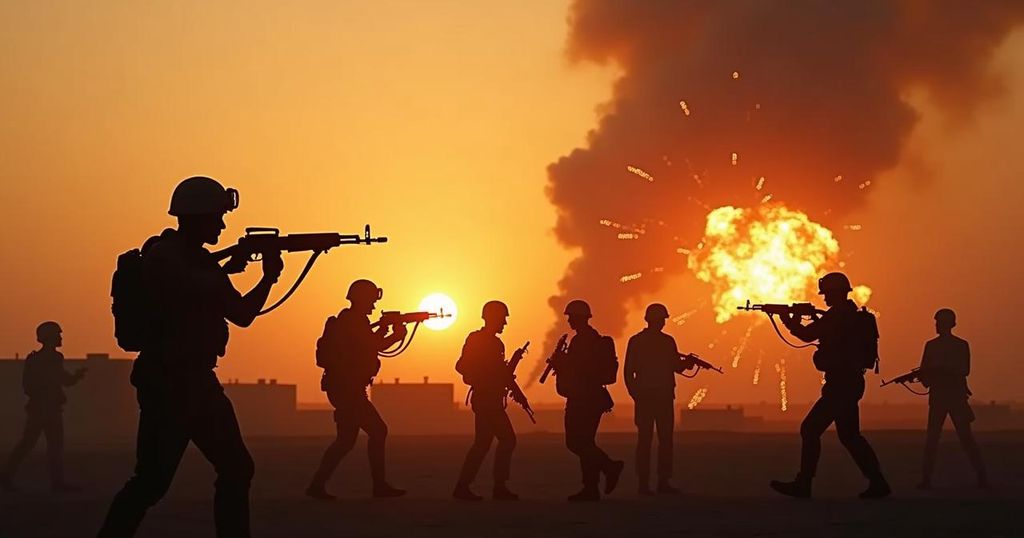Israel’s military operations have expanded with airstrikes against Houthi targets in Yemen and ongoing attacks on Hezbollah in Lebanon, risking regional conflict. Following the assassination of Hezbollah leader Hassan Nasrallah, tensions have heightened, resulting in substantial civilian casualties and displacement, drawing international calls for a ceasefire. Israel’s actions are framed as a strategic response to Iranian influence and regional destabilization efforts.
Israel has intensified its military campaign across the Middle East by conducting airstrikes targeting Houthi positions in Yemen and continuing its bombardment on Hezbollah in Lebanon. This marked a significant expansion of Israel’s operations against Iran-affiliated groups in the region. On Sunday, Israeli forces targeted the strategic port of Hodeidah in Yemen, employing a substantial aerial assault involving numerous aircraft aimed at fuel facilities, power plants, and docks at both the Ras Issa and Hodeidah ports. This operation represents one of the largest assaults witnessed amid the ongoing conflict in Yemen, which has persisted for nearly a year. Israeli military officials assert that the attacks were specifically aimed at the Houthis, who have controlled much of Yemen since seizing the capital, Sana’a, in 2014. The Houthis have previously engaged in missile attacks on Israeli targets, claiming such actions are in solidarity with Palestinians suffering in Gaza. They have also threatened international maritime operations within the Red Sea. Recent hostilities escalated with a ballistic missile fired at Tel Aviv’s Ben Gurion Airport concurrently with Prime Minister Benjamin Netanyahu’s arrival in Israel. The Israeli military described the selected targets as essential for the Houthis’ operations, indicating that they are utilized for the transfer of Iranian weaponry and military supplies intended for hostility against Israel and regional stability. Consequently, the Israeli military characterized the Houthis as acting under Iranian directives and financial support, collaborating with various Iraqi militia groups. Reports indicate that the strikes resulted in widespread power outages in Hodeidah. This military offensive came on the heels of previous attacks in Lebanon, which included the elimination of prominent Hezbollah leader Hassan Nasrallah. His death has been deemed a significant strategic blow to Hezbollah and Iranian influence within the region, as he played a pivotal role in solidifying the militant group’s position as a key player in the anti-Israel coalition known as the “Axis of Resistance.” In Lebanon, Israeli bombardments have resulted in substantial civilian casualties, with estimates of over 1,000 individuals killed since the attacks escalated. Recent strikes, particularly focused on Ain Deleb in southern Lebanon, have been recorded as resulting in numerous fatalities and injuries. Amid the violence, over 200,000 people are reportedly displaced within Lebanon, with additional thousands fleeing to Syria. The international community has reacted with growing concern regarding these aggressive military actions. The White House warned against the continuation of war, suggesting that Israel’s security cannot be attained through all-out conflict with Hezbollah or Iran. Similarly, European officials, including French and UK foreign ministers, have urged an immediate ceasefire, highlighting the risks of further destabilizing Lebanon and the broader regional context. Pope Francis also voiced his condemnation of the escalating military assaults, emphasizing the need for moral considerations even amidst warfare. As the situation deteriorates, the Israeli military is reportedly contemplating a potential limited ground operation in Lebanon, asserting that further military engagements could shift the balance of power significantly in the region for the foreseeable future.
The article discusses the ongoing military conflict involving Israel, Hezbollah, and the Houthis in Yemen, emphasizing the recent escalation of hostilities. Israel’s airstrikes on Houthi targets and its sustained bombardment of Hezbollah signal a broader military strategy aimed at both Iranian proxies and regional stability. This conflict’s roots lie in the historical tensions in the Middle East, driven by long-standing geopolitical rivalries, sectarian divisions, and the involvement of external powers such as Iran. The article highlights recent developments, including key military operations and the implications of the assassination of Hezbollah leader Hassan Nasrallah, which could drastically alter the dynamics within the region and prompt further violent confrontations.
In conclusion, the recent escalation of military actions by Israel against Houthi targets in Yemen and Hezbollah in Lebanon underlines a critical moment in the ongoing conflict in the Middle East. This wave of airstrikes signifies an aggressive approach to counter Iranian influence and proxy warfare in the region. Moreover, the assassination of Hassan Nasrallah has removed a pivotal figure in Hezbollah, posing further implications for stability in Lebanon and broader regional security. With a growing number of civilian casualties and a significant number of displaced persons, the international community’s calls for a ceasefire become increasingly urgent as the potential for a larger conflict looms.
Original Source: www.theguardian.com






